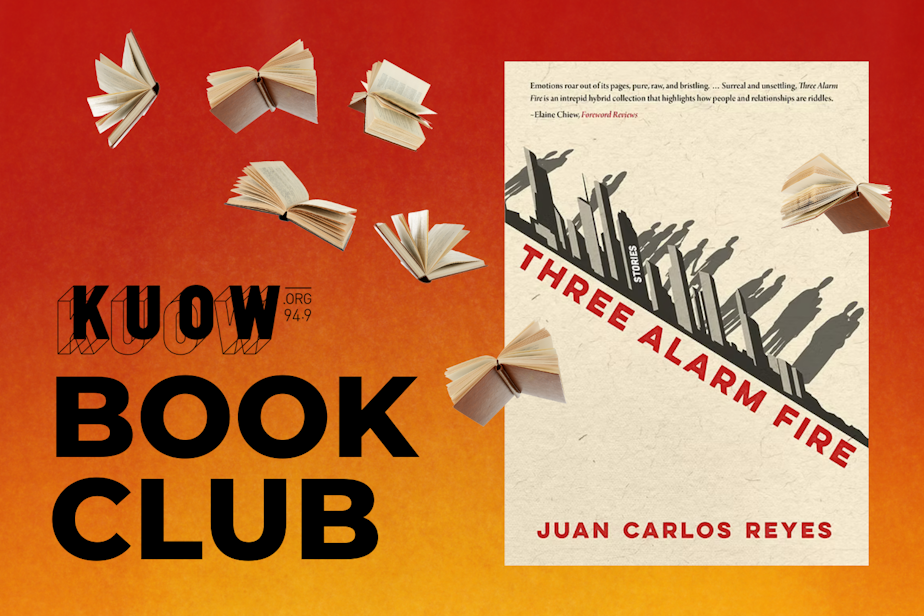Seattle author Juan Carlos Reyes explores the good, the bad, the ugly of the human experience in 'Three Alarm Fire'

This is KUOW's book club, and we just read through the first half of Juan Carlos Reyes' fiction collection "Three Alarm Fire." I'm your club guide, Katie Campbell. Let's get into it.
R
eyes' collection is broken up into sections that explore what I've started thinking of as the good, the bad, and the ugly of the human experience from several perspectives. The result is a collection of stories that dissect things like love, fear — or "scared," as its called and anthropomorphized in the first story — and violence through the author's unique prose.
Some stories are more successful than others. In the section "Of Hearts and Minds," which I saw as the love section, the story called "In Defense of Unnameable Things" left me feeling more like I was missing something than I was in on something.
But with stories like "Warrior, New Jersey" — also in the love section — and "Poetics of a Broken Conversation" in the titular "Three Alarm Fire" section, Reyes should be forgiven if a reader can't quite connect to every word. Because the words I did connect with rocked me.
RELATED: KUOW Book Club's January pick: Juan Carlos Reyes' fiction collection exploring grief and healing
Sponsored
"Warrior" and "Poetics" highlight Reyes' ability to lift his readers up high with good vibes and to bring them crashing down into uncomfortable levels of self-awareness.
In "Warrior," two college students slowly fall in love in the midst of becoming adults — and all the tiresome responsibilities that comes with. Reyes describes this process from our narrator's perspective, in a poetic pattern, like an equation but prettier. It starts here:
The pattern develops next:
And the equation reaches a logical but no less lovely satisfying solution:
Readers, this was a Grade A love story — and I hate love stories! I don't do flowery language or "will they, won't they" plots and the like. But I loved this love story. And I think that's because he took the mundane pieces, the evolution of feelings, and let them be special. I don't need drawn out passages about how a man comes to love a woman. All I need, it turns out, is to know "a friend becomes a woman" and the magic of feeling "unprepared" for that moment.
That's humanity, plain and simple and somehow magnificent because it exists.
Reyes can take the plain and simple and also highlight how messed up it can be, too.
Sponsored
RELATED: Subscribe to the KUOW Book Club newsletter here
When I started the "Three Alarm Fire" section, I hoped it would be a real standout, making it clear why the whole book bears the same name. And it sure did just that.
This section begins with "Poetics of a Broken Conversation," rife with quiet devastation. It's a deeply unsettling story from start to finish, thanks in large part to the tension Reyes builds as the narrator processes an unnamed tragedy.
At first, Reyes leads the reader to believe this is a poignant, albeit standard, critique of how the U.S. copes — or doesn't — with tragedy.
The narrator's ennui continues as they — you? — make their way to their as-yet-unknown destination. But that ennui seems to be shifting into something more desperate:
That passage is gut-wrenching in its familiarity.
But a few pages later, the familiarity in this person's desperation to do something is ripped away when they reveal their destination: the home of a grieving family. Again, Reyes takes us from plain and simple to magnificent, or magnificently tense.
The narrator explains they're trying to "collaborate" with this family, which has not returned the narrator's efforts to get in touch. And now, they're at the family's house. They're live-streaming outside of the family's house. Like I said: gut-wrenching in its familiarity.
Sponsored
Chilling. And it doesn't get less chilling, as neighbors spot the narrator, interrogate them, attack them, and, ultimately, shoot them. It's a demonstration of mob mentality, but it's complicated because it's borne out of a desire to protect the grieving family. This is not a feel-good story like "Warrior, New Jersey." And it's not a standard critique.
There's nothing really standard about the collection, so far, at all.
Reyes presents us with a wide range of characters in a way that I would have believed they were written by a wide range of authors if I didn't know better. The result is engaging, and it's left me excited to keep reading — and to talk to Reyes about how it all came together.
----------------------------------------------------------------------------------------
Sponsored
Spoiler alert: I have found February's pick — and it's a cookbook! We'll be reading and cooking with "Feasts of Good Fortune" by Seattleites Hsiao-Ching Chou and Meilee Chou Riddle. It came highly recommended by KUOW foodie and food reporter Ruby de Luna, and I was sold pretty quickly. The book offers 75 recipes "for a full year of celebrations with family and friends the Chinese American way in this deeply personal intergenerational cookbook, cowritten by mother and daughter." Heckin' yes!
And while you're here, a reminder: This year, I'll be announcing my picks on the first of each month. That just helps me ensure we have enough time to read and really enjoy each book equally.
As always, you can join the conversation by emailing me directly at kcampbell@kuow.org. You can also subscribe to the Book Club newsletter here.



